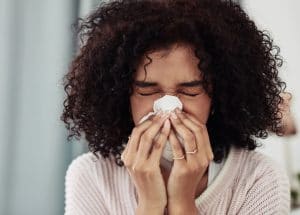What Causes Seasonal Allergies?
Seasonal allergies, also known as hay fever or allergic rhinitis, affect millions of people, causing discomfort and disrupting daily activities. We understand how these...
Posted on August 18, 2020
AllergyWith the coronavirus pandemic coinciding with upcoming fall allergy season, individuals with allergies are having trouble distinguishing whether their symptoms are the result of exposure to pollen and other allergen triggers, or associated with COVID-19. In order to alleviate any unnecessary fear, understanding the differences between allergies and coronavirus—while acknowledging that there are certain similarities—is key.

One of the biggest differences between the two? Allergy symptoms generally are the same from year to year. Any significant change in allergy symptoms from what you normally experience should prompt you to seek medical attention just to be on the safe side.
Generally speaking, symptoms associated with allergies and COVID-19 are as follows:
Probably the biggest difference is the presence of a fever. Seasonal allergy sufferers rarely experience an elevated temperature, but it’s one of the main symptoms of the coronavirus. Additionally, a loss of smell or taste is experienced by a significant number of COVID-19 patients, even in the absence of other symptoms.
Because shortness of breath is often associated with asthma, people suffering from the breathing disorder may also be uncertain whether their symptoms are the result of asthma or COVID-19. The same applies to patients with COPD (chronic obstructive pulmonary disease), whose symptoms are often exacerbated by seasonal allergies. Erring on the side of caution is best; if you are having trouble breathing but aren’t experiencing allergy symptoms, it’s best to seek medical attention.
If you are experiencing seasonal allergy symptoms, treat them as you normally would; over-the-counter nasal corticosteroid sprays and antihistamines work best. If these medications don’t ease your symptoms within a day or two, let your doctor know. If you develop a dry cough, fever or shortness of breath, or think you might have been exposed to somebody with COVID-19, alert your health care provider immediately.
Seasonal allergies, also known as hay fever or allergic rhinitis, affect millions of people, causing discomfort and disrupting daily activities. We understand how these...
Could Honey Cure Your Allergies? In Lubbock, Texas, Cal Brints, a local honey producer, thinks local raw honey is the bee’s knees as a treatment...
April 22nd is Earth Day, part of a worldwide movement to focus on and care for our environment. As you celebrate Earth Day by...
Does cold winter weather have you hunkering down at home in hibernation mode? If so, you’re probably tempted to turn the thermostat way up,...